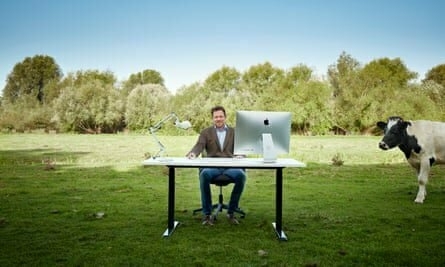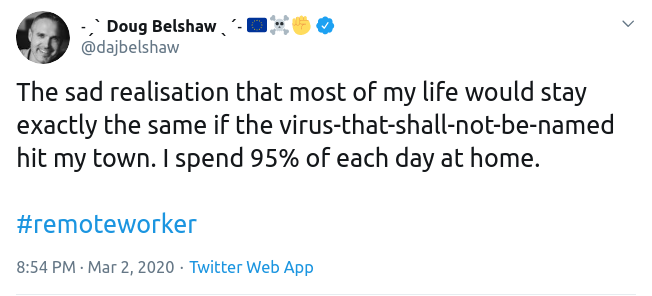- Schools
- Volunteering
- Offices
- House prices
- Community cohesion
- High street
- Home delivery
The clever man often worries; the loyal person is often overworked

👏 Blue sky thinking: is it time to stop work taking over our lives?
🤦♂️ How Not To Kill People With Spreadsheets
🕸️ Viral Effects Are Not Network Effects
🤯 Inventing Virtual Meetings of Tomorrow with NVIDIA AI Research
Quotation-as-title from a Chinese proverb. Image from top-linked post.
Friday flickerings
I've tried to include some links here to other things here, but just like all roads read to Rome, all links eventually point to the pandemic.
I hope you and people that you care about are well. Stay safe, stay indoors, and let me know which of the following resonate with you!
Supermensch
Our stories about where inventiveness comes from, and how the future will be made, overwhelmingly focus on the power of the individual. Such stories appeal to the desire for human perfection (and redemption?) recast in technological language, and they were integral to the way that late-19th-century inventor-entrepreneurs, such as Tesla or Thomas Edison, presented themselves to their publics. They’re still very much part of the narrative of technological entrepreneurism now. Just as Tesla wanted to be seen as a kind of superhero of invention, unbound by conventional restraints, so too do his contemporary admirers at the cutting edge of the tech world. Superheroes resonate within that culture precisely because they embody in themselves the perception of technology as something that belongs to powerful and iconoclastic individuals. They epitomise the idea that technological culture is driven by outsiders. The character of Iron Man makes this very clear: after all, he really is a tech entrepreneur, his superpowers the product of the enhanced body armour he wears.
Iwan Rhys Morus (Aeon)
A really interesting read about the link between individualism, superheroes, technology, and innovation.
The Second Golden Age of Blogging
Blogging was then diffused into social media, but now social media is so tribal and algo-regulated that anybody with a real message today needs their own property. At the same time, professional institutions are increasingly suffocated by older, rent-seeking incumbents and politically-correct upstarts using moralism as a career strategy. In such a context, blogging — if it is intelligent, courageous, and consistent — is currently one of the most reliable methods for intellectually sophisticated individuals to accrue social and cultural capital outside of institutions. (Youtube for the videographic, Instagram for the photographic, podcasting for the loquacious, but writing and therefore blogging for the most intellectually sophisticated.)
Justin Murphy (Other LIfe)
I've been blogging since around 2004, so for sixteen years, and through all of my career to date. It's the best and most enjoyable thing about 'work'.
NASA Fixes Mars Lander By Telling It to Hit Itself With a Shovel
NASA expected its probe, dubbed “the mole,” to dig its way through sand-like terrain. But because the Martian soil clumped together, the whole apparatus got stuck in place.
Programming InSight’s robotic arm to land down on the mole was a risky, last-resort maneuver, PopSci reports, because it risked damaging fragile power and communication lines that attached nearby. Thankfully, engineers spent a few months practicing in simulations before they made a real attempt.
Dan Robitzski (Futurism)
The idea of NASA engineers sending a signal to a distant probe to get it to hit itself, in the midst of a crisis on earth, made me chuckle this week.

Act as if You’re Really There
Don’t turn your office into a generic TV backdrop. Video is boring enough. The more you remove from the frame, the less visual data you are providing about who you are, where you live, how you work, and what you care about. If you were watching a remote interview with, say, Bong Joon-ho (the South Korean director of Parasite) would you want him sitting on a blank set with a ficus plant? Of course not. You would want to see him in his real office or studio. What are the posters on his wall? The books on his shelf? Who are his influences?
Douglas Rushkoff (OneZero)
Useful advice in this post from Douglas Rushkoff. I appreciate his reflection that, "every pixel is a chance to share information about your process and proclivities."
People Are Looping Videos to Fake Paying Attention in Zoom Meetings
On Twitter, people are finding ways to use the Zoom Rooms custom background feature to slap an image of themselves in their frames. You can record a short, looping video as your background, or take a photo of yourself looking particularly attentive, depending on the level of believability you're going for. Zoom says it isn't using any kind of video or audio analysis to track attention, so this is mostly for your human coworkers and boss' sake. With one of these images on your background, you're free to leave your seat and go make a sandwich while your boss thinks you're still there paying attention:
Samantha Cole (Vice)
As an amusing counterpoint to the above article, I find it funny that people are using video backgrounds in this way!
A Guide to Hosting Virtual Events with Zoom
There are lots of virtual event tools out there, like Google Hangouts, YouTube Live, Vimeo Live. For this guide I’ll delve into how to use Zoom specifically. However, a lot of the best practices explored here are broadly applicable to other tools. My goal is that reading this document will give you all the tools you need to be able to set up a meeting and host it on Zoom (or other platforms) in fun and interactive ways.
Alexa Kutler (Google Docs)
This is an incredible 28-page document that explains how to set up Zoom meetings for success. Highly recommended!

The rise of the bio-surveillance state
Elements of Asia’s bio-surveillance revolution may not be as far off as citizens of Western democracies assume. On 24 March an emergency bill, which would relax limits on urgent surveillance warrants, went before the House of Lords. In any case, Britain’s existing Investigatory Powers Act already allows the state to seize mobile data if national security justifies it. In another sign that a new era in data rights is dawning, the EU is reviewing its recent white paper on AI regulation and delaying a review of online privacy rules. Researchers in both Britain (Oxford) and the US (MIT) are developing virus-tracking apps inviting citizens to provide movement data voluntarily. How desperate would the search for “needles in haystacks” have to get for governments to make such submissions compulsory? Israel’s draconian new regulations – which allegedly include tapping phone cameras and microphones – show how far down this road even broadly Western democracies might go to save lives and economies.
Jeremy Cliffe (New Statesman)
We need urgent and immediate action around the current criss. But we also need safeguards and failsafes so that we don't end up with post-pandemic authoritarian regimes.
The economy v our lives? It's a false choice – and a deeply stupid one
Soon enough, as hospitals around the world overflow with coronavirus patients, exhausting doctors, nurses, orderlies, custodians, medical supplies, ventilators and hospital cash accounts, doctors will have to make moral choices about who lives or dies. We should not supersede their judgment based on a false choice. Economic depression will come, regardless of how many we let die. The question is how long and devastating it will be.
Siva Vaidhyanathan (The Guardian)
Not exactly a fun read, but the truth is the world's economy is shafted no matter which way we look at it. And as I tweeted the other day, there's no real thing that exists, objectively speaking called 'the economy' which is separate from human relationships.
How the Pandemic Will End
Pandemics can also catalyze social change. People, businesses, and institutions have been remarkably quick to adopt or call for practices that they might once have dragged their heels on, including working from home, conference-calling to accommodate people with disabilities, proper sick leave, and flexible child-care arrangements. “This is the first time in my lifetime that I’ve heard someone say, ‘Oh, if you’re sick, stay home,’” says Adia Benton, an anthropologist at Northwestern University. Perhaps the nation will learn that preparedness isn’t just about masks, vaccines, and tests, but also about fair labor policies and a stable and equal health-care system. Perhaps it will appreciate that health-care workers and public-health specialists compose America’s social immune system, and that this system has been suppressed.
Ed Yong (The Atlantic)
Much of this is a bit depressing, but I've picked up on the more positive bit towards the end. See also the article I wrote earlier this week: People seem not to see that their opinion of the world is also a confession of character
Enjoy this? Sign up for the weekly roundup, become a supporter, or download Thought Shrapnel Vol.1: Personal Productivity!
Header image by Sincerely Media.
We are too busy mopping the floor to turn off the faucet
Pandemics, remote work, and global phase shifts
Last week, I tweeted this:

I get the feeling that, between film and TV shows on Netflix, Amazon deliveries, and social interaction on Twitter and Mastodon, beyond close friends and family, no-one would even realise if I'd been quarantined.
Writing in The Atlantic, Ian Bogost points out that Every Place Is the Same Now, because you go to every place with your personal screen, a digital portal to the wider world.
Anywhere has become as good as anywhere else. The office is a suitable place for tapping out emails, but so is the bed, or the toilet. You can watch television in the den—but also in the car, or at the coffee shop, turning those spaces into impromptu theaters. Grocery shopping can be done via an app while waiting for the kids’ recital to start. Habits like these compress time, but they also transform space. Nowhere feels especially remarkable, and every place adopts the pleasures and burdens of every other. It’s possible to do so much from home, so why leave at all?
Ian Bogost (The Atlantic)
If you're a knowledge worker, someone who deals with ideas and virtual objects rather than things in 'meatspace', then there is nothing tying you to a particular geographical place. This may be liberating, but it's also quite... weird.
It’s easy but disorienting, and it makes the home into a very strange space. Until the 20th century, one had to leave the house for almost anything: to work, to eat or shop, to entertain yourself, to see other people. For decades, a family might have a single radio, then a few radios and a single television set. The possibilities available outside the home were far greater than those within its walls. But now, it’s not merely possible to do almost anything from home—it’s also the easiest option. Our forebears’ problem has been inverted: Now home is a prison of convenience that we need special help to escape.
Ian Bogost (The Atlantic)
I've worked from home for the last eight years, and now can't imagine going back to working any other way. Granted, I get to travel pretty much every month, but that 95% being-at-home statistic still includes my multi-day international trips.
I haven't watched it recently, but in 2009 a film called Surrogates starring Bruce Willis foreshadowed the kind of world we're creating. Here's the synopsis via IMDB:
People are living their lives remotely from the safety of their own homes via robotic surrogates — sexy, physically perfect mechanical representations of themselves. It's an ideal world where crime, pain, fear and consequences don't exist. When the first murder in years jolts this utopia, FBI agent Greer discovers a vast conspiracy behind the surrogate phenomenon and must abandon his own surrogate, risking his life to unravel the mystery.
IMDB
If we replace the word 'robotic' with 'virtual' in this plot summary, then it's a close approximation to the world in which some of us now live. Facetuned Instagram selfies project a perfect life. We construct our own narratives and then believe the story we have concocted. Everything is amazing but no-one's happy.
Even Zoom, the videoconferencing software I use most days for work, has an option to smooth out wrinkles, change your background, and make everything look a bit more sparkly. Our offline lives can be gloriously mundane, but online, thanks to various digital effects, we can make them look glorious. And why wouldn't we?
I think we'll see people and businesses optimising for how they look and sound online, including recruitment. The ability to communicate effectively at a distance with people who you may never meet in person is a skill that's going to be in high demand, if it isn't already.
Remote working may be a trend, but one which is stubbornly resisted by some bosses who are convinced they have to keep a close eye on employees to get any work out of them.
However, when those bosses are forced to implement remote working policies to keep their businesses afloat, and nothing bad happens as a result, this attitude can, and probably will, change. Remote working, when done properly, is not only more cost-effective for businesses, but often leads to higher productivity and self-reported worker happiness.
Being 'good in the room' is fine, and I'm sure it will always be highly prized, but I also see confident, open working practices as something that's rising in perceived value. Chairing successful online meetings is at least as important as chairing ones offline, for example. We need to think of ways of being able recognise these remote working skills, as it's not something in which you can receive a diploma.
For workers, of course, there are so many benefits of working from home that I'm not even sure where to start. Your health, relationships, and happiness are just three things that are likely to dramatically improve when you start working remotely.
For example, let's just take the commute. This dominates the lives of non-remote workers, usually taking an hour or more out of a their day — every day. Commuting is tiring and inconvenient, but people are currently willing to put up with long commutes to afford a decently-sized house, or to live in a nicer area.
So, let's imagine that because of the current pandemic (which some are calling the world's biggest remote-working experiment) businesses decide that having their workers being based from home has multi-faceted benefits. What happens next?
Well, if a large percentage (say we got up to ~50%) of the working population started working remotely over the next few months and years, this would have a knock-on effect. We'd see changes in:
...to name but a few. I think it would be a huge net benefit for society, and hopefully allow for much greater civic engagement and democratic participation.
I'll conclude with a quotation from Nafeez Ahmed's excellent (long!) post on what he's calling a global phase shift. Medium says it's a 30-minute read, but I reckon it's about half that.
Ahmed points out in stark detail the crisis, potential future scenarios, and the opportunity we've got. I particularly appreciate his focus on the complete futility of what he calls "a raw, ‘fend for yourself’ approach". We must work together to solve the world's problems.
The coronavirus outbreak is, ultimately, a lesson in not just the inherent systemic fragilities in industrial civilization, but also the limits of its underlying paradigm. This is a paradigm premised on a specific theory of human nature, the neoclassical view of Homo-Economicus, human beings as dislocated units which compete with each other to maximise their material self-gratification through endless consumption and production. That paradigm and its values have brought us so far in our journey as a species, but they have long outlasted their usefulness and now threaten to undermine our societies, and even our survival as a species.
Getting through coronavirus will be an exercise not just in building societal resilience, but relearning the values of cooperation, compassion, generosity and kindness, and building systems which institutionalize these values. It is high time to recognize that such ethical values are not simply human constructs, products of socialization. They are cognitive categories which reflect patterns of behaviour in individuals and organizations that have an evolutionary, adaptive function. In the global phase shift, systems which fail to incorporate these values into their structures will eventually die.
Nafeez Ahmed
Just as crises can be manufactured by totalitarian regimes to seize power and control populations, perhaps natural crises can be used to make us collectively realise we need to pull together?
Enjoy this? Sign up for the weekly roundup, become a supporter, or download Thought Shrapnel Vol.1: Personal Productivity!
Header image by pan xiaozhen. Anonymous quotation-as-title taken from Scott Klososky's The Velocity Manifesto